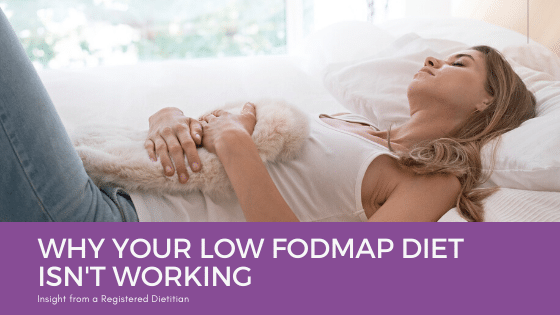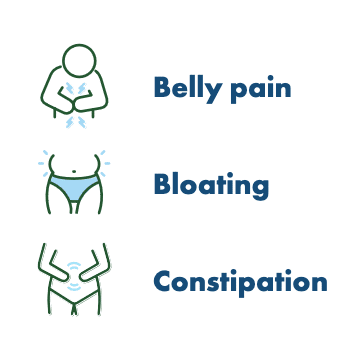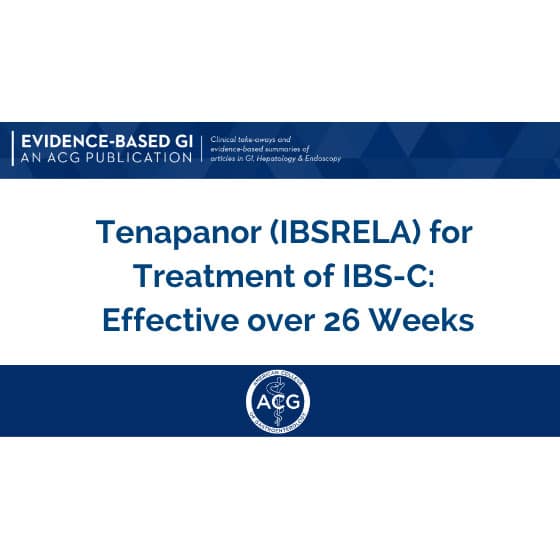Why Your Low FODMAP Diet Isn’t Working
The low FODMAP diet is a temporary elimination diet that can help those with IBS control their symptoms. While the diet works for some people, others may not see the benefits they were hoping for.
If you are on the low FODMAP diet and don’t think it’s helping, there are a few questions you can ask yourself to help troubleshoot the diet.
Do you have an IBS diagnosis?
The majority of the research done on the low FODMAP diet focuses on those with IBS. If you have another digestive condition, the low FODMAP diet may not be right for you.
It’s important to work with your gastroenterologist who will evaluate your symptoms and will likely recommend testing. IBS is a diagnosis of exclusion, which means that if all the other tests come back negative and you meet the criteria, then you may be given an IBS diagnosis by your doctor.
If you are attempting to treat your self-diagnosed IBS symptoms with the low FODMAP diet, please make an appointment to see your doctor right away.
Are you following the diet correctly?
The low FODMAP diet is very complex and requires a high level of understanding to follow correctly. If you printed a low and high FODMAP food list from the internet and are using that as your guide, there is a possibility that the information is not accurate or outdated.
Another potential problem is forgetting to take serving sizes into account. There are foods that are considered low FODMAP at one serving size, but become high FODMAP if a larger portion is eaten. For example, 10 almonds is a low FODMAP serving size, but 20 almonds is considered high FODMAP.
Working with a registered dietitian can help you be sure that you are following the low FODMAP diet correctly.
Has it been long enough?
The first phase, often called the elimination phase, of the low FODMAP diet usually lasts from 2-8 weeks. Some people may start feeling better after only a few days, but others may need multiple weeks to feel the full benefits of the diet.
If you are only a few weeks into the diet, you may just need to give it more time before throwing in the towel.
Are you eating too many gut irritants?
While some people with IBS are sensitive to FODMAPs, there are other foods and drinks that might be adding to your symptoms.
Caffeine
Caffeine can stimulate your gut and cause food to move through your intestines faster than usual. If your coffee habit is triggering your IBS symptoms, it might be time to cut back. Just be sure to watch out for coffee substitutes that can be made with high FODMAP ingredients like inulin or chicory root.
Peppers
Have you heard of capsaicin? Both hot peppers and bell peppers contain this known gut irritant. Even if you are sticking to a low FODMAP diet, you may still be getting triggered by spicy foods or bell peppers.
Alcohol
It seems fairly obvious that alcohol is a gut irritant, but some people don’t realize that alcohol can trigger their IBS symptoms. If you are sticking to the low FODMAP section of the alcohol list, be warned that even though the drink is low FODMAP, the alcohol itself can still lead to a flare. Minimize your overall intake of alcohol and see how it affects your symptoms.
When to call it quits
Now you know the factors that might be holding you back from success on the low FODMAP diet and you can make any necessary changes. If none of the above applies to you and you think you’ve given the low FODMAP diet an honest try, it’s time to reevaluate.
Don’t lose heart! There are plenty of other tools that your healthcare team can use to help you find relief from your symptoms! Work with your gastroenterologist and dietitian to determine what the next trial is in your IBS management plan.
Katelyn Collins, RD is a registered dietitian specializing in irritable bowel syndrome (IBS) and digestive health. Katelyn’s personal experience with IBS first sparked her passion for nutrition and health. Since then, she has been a vocal advocate for the digestive health community and has dedicated her own nutrition practice to serving those with digestive conditions.
Listen to our
latest Podcast!






